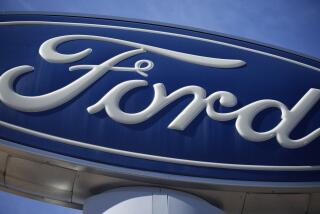GM Engages Ford in a War of Words Over Fuel Efficiency
PONTIAC, Mich. — The gloves came off in Detroit’s fuel-efficiency wars Wednesday as General Motors Corp. unveiled hybrid gasoline-electric trucks and buses and suggested that Ford Motor Co. is being less than honest in portraying itself as the auto industry’s environmental leader.
GM Vice Chairman Harry Pearce said he was “seriously annoyed” at Ford’s announcement last week that it would increase fuel economy in its sport-utility vehicles 25% by 2005.
“While we are not prone to making bold claims, clarification is clearly in order,” Pearce said at a hastily organized news conference at GM’s Truck Product Center in this northern Detroit suburb.
“GM leads Ford today in truck fuel economy both on average and on a model-by-model basis, including SUVs,” Pearce said. “General Motors will still be the leader in five years, or 10 years, or for that matter 20 years. End of story.”
Although auto executives occasionally take jabs at one another’s products in public, it is unusual for a senior executive to denounce a cross-town rival by name.
“I don’t know why [Pearce] would be focusing on Ford, blasting them for publicizing their efforts,” said Greg Salchow, auto industry analyst at the investment bank Raymond James & Co. in Detroit. Salchow says that although GM has superior fuel efficiency, Ford has been more adept at publicizing its achievements.
Given cutthroat competition and consumers’ growing environmental awareness, auto makers are increasingly using gas-mileage bragging rights as a marketing tool.
According to Environmental Protection Agency data for the 2001 model year, Ford’s truck fleet has an average fuel economy of 20.8 mpg, while GM’s average is 21.0 mpg.
“What this debate ought to be about is being intellectually honest in the environmental debate,” Pearce said.
Ford Chief Executive Jac Nasser made the announcement about his company’s plans to boost truck fuel efficiency in a speech in Washington on Friday, generating headlines around the country.
“We’re committed to doing it. What’s intellectually dishonest?” Ford spokesman Ken Zino said. “I don’t know what he’s implying, that we’re not going to make the 25% commitment?”
Zino noted that Ford has followed through on its pledge to make all its SUVs and minivans conform to so-called LEV, or low-emissions vehicle, standards.
“We never made the claim that we’re going to lead the industry in efficiency,” he said. “We said we would increase our efficiency.”
Overall, GM’s SUVs beat Ford in gas mileage by 6%, Pearce said. GM’s hulking Suburban gets 2 mpg more than the even larger Ford Excursion, he said. GM’s Chevrolet Tahoe and GMC Yukon beat Ford’s Expedition and Lincoln Navigator by 1 mpg, and the four-wheel-drive Chevy Blazer gets at least 0.5 mpg more than the equivalent Ford Explorer and Mercury Mountaineer.
The Sierra Club welcomed GM’s pledge but said its optimism is tempered by the “lack of details” in the announcement.
“We look forward to seeing action from auto makers rather than squabbles about numbers,” said Daniel Becker, director of the Sierra Club’s global warming and energy program. “However, we accept GM’s desire to improve fuel economy in good faith and urge DaimlerChrysler to join the race before they’re left in the dust.”
Pearce said GM will introduce hybrid-powered pickups and SUVs that get 15% better mileage than current models. Models such as the Silverado pickup and Tahoe SUV would be fitted with a standard eight-cylinder gasoline engine wedded to an electric motor. The engines would turn themselves off when the trucks come to a stop; the electric motor would restart the engine from a standstill and provide other efficiencies that GM executives would not discuss.
GM will also build hybrid-powered buses that will get 50% better mileage while reducing hydrocarbons and particulates by 90% and nitrogen oxides by 50%. If the 13,000 transit buses in the country’s nine largest cities used such technology they would save 38 million gallons of fuel a year, Pearce said.
Hybrid bus deliveries will begin in October to U.S. cities of more than 1 million people. Pearce wouldn’t say which cities have bought them, but “L.A. would be a wonderful example,” he said.






